










          |
| 2019 / 2018 CD releases... |
 |
CDs released during 2019 and 2018
........................ CDs released 2017 2016 2015 2014
| Fontana | "Grits, Beans and Greens - The Tubby Hayes Quartet "The Lost Fontana Studio Sessions 1969" | 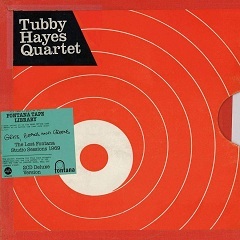 A newly discovered studio album from Tubby Hayes recorded in 1969 is released for the first time.
A newly discovered studio album from Tubby Hayes recorded in 1969 is released for the first time.Thought to be either lost or destroyed until their recent rediscovery, these 1969 sessions are being hailed as among the very best work in the Hayes discography. “Sometimes when tapes than have been lost or rumoured to exist finally surface there is a touch of anti-climax or the need to 'spin' them in a way that makes them more important than they are” explains Hayes' biographer and award-winning British jazz saxophonist Simon Spillett. “These sessions, on the other hand, are absolute classics in every regard. It's an album that can sit equally alongside the best Coltrane, Rollins or Dexter Gordon LPs. It really is a lost masterpiece, make no mistake.” Hayes entered the studio in London for the first date with his new working quartet that included two youthful membership changes from the line-up that delivered 1967’s masterpiece, ‘Mexican Green’. Dublin guitarist, Louis Stewart and drummer Spike Wells had been with Hayes for only a matter of months and this was to be their first experience of the disciplines of the recording studio. There were difficulties the session produced just three complete takes of ‘Where Am I Going’ from the musical ‘Sweet Charity’. By June, Hayes’ former pianist, Mike Pyne, was available and replaced Stewart for the second session. After his tragic death following open-heart surgery, aged just 38, in 1973, the tapes were simply filed away, eventually becoming mislaid as the label's archives went through a series of corporate buy-outs. The tapes were discovered when the late jazz writer and Polygram Catalogue Manager Richard Cook came across Hayes’ diary and noticed entries detailing a number of recording sessions. He subsequently trawled through the Polygram archives and made what was to be one of the most significant discoveries in jazz history when he came across the never-before-heard 1969 tapes. Cook left the company before the tapes were released and it wasn’t until last year that knowledge of their existence resurfaced. Upon discovery of the tapes, Decca hired high-end vinyl specialists Gearbox Studios to master the sessions for the first time. They created a 180-gram vinyl edition employing an original 1960s-era Studer C37 tape machine and a Scully Lathe (the same model employed by jazz record engineering god Rudy Van Gelder).Track list... The release comes in three formats: CD - Standard Jewel Case CD. 5 Tracks. LP - 180 Gram Vinyl plus Booklet Insert. 5 Tracks. 2CD - Deluxe Hardback Package and 52 Page Booklet. Complete Sessions (18 tracks) Including alt. takes and false starts and studio chatter. Acrobat | "Groovin High - Jam Session at The Hopbine 1965" | 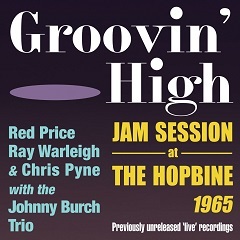 London in the mid-Sixties was well acknowledged to be a musical crucible. As all
manner of stylistic ingredients got thrown into the mix, it wasn't uncommon to
find jazz musicians crossing the line to work in R&B bands and young pop stars
in turn embracing jazz. For open-eared players, it was a boom time, both inside
the studio, where their session men skills propped up many a lesser talent and
outside, gigging in the sprawl of the capitals many suburban jazz clubs. This
previously unreleased recording presents what is, in essence, a microcosm of
those times. Taped at North Wembley's legendary jazz mecca, The Hopbine, and
centred upon that most traditional of formats the jam session the featured cast
list makes this set anything but a dull tread over old pub-jazz ground. Take the
front-line; alto saxophonist Ray Warleigh and trombonist Chris Pyne, then both
in their mid-twenties, were among the most exciting new voices on the UK jazz
scene, then both broadening their outlooks in the bands of blues-guru Alexis
Korner and avant-garde pioneer John Stevens. The rhythm section was just as hard
to pigeon-hole; a dyed in the wool straightahead modernist whose work already
included a stint with Brit-Jazz legend Don Rendell, pianist Johnny Burch had
nevertheless recently penned a B-Side for Georgie Fame, while Ron Mathewson,
then still a member of the Dixieland band of Alex Welsh, was already making
waves as one of the UK's most adventurous young modern jazz bassists. Added to
this youthful unit is veteran tenor saxophonist Red Price, a musician rare among
his generation; a player who'd not only proved his mettle in the big band of Ted
Heath but who had quickly embraced the language of rock and roll in the 1950s,
becoming one of Britain's leading session men, able to fit in virtually every
musical context from Lord Rockingham's XI to Frankie Vaughan. The music these
men made together on this night in 1965 may not be earth shattering or
prophetic, yet it captures a snapshot of an era long gone when great individual
improvising voices were prepared to forget their own artistic bias and get
together on a pub stage to address the business of swinging, no-holds barred,
jazz. In stunning sound and packaged with a booklet note by award-winning
saxophonist and author Simon Spillett, this is an album as unpretentious and
enjoyable as it is historic. (70 minutes plus)
London in the mid-Sixties was well acknowledged to be a musical crucible. As all
manner of stylistic ingredients got thrown into the mix, it wasn't uncommon to
find jazz musicians crossing the line to work in R&B bands and young pop stars
in turn embracing jazz. For open-eared players, it was a boom time, both inside
the studio, where their session men skills propped up many a lesser talent and
outside, gigging in the sprawl of the capitals many suburban jazz clubs. This
previously unreleased recording presents what is, in essence, a microcosm of
those times. Taped at North Wembley's legendary jazz mecca, The Hopbine, and
centred upon that most traditional of formats the jam session the featured cast
list makes this set anything but a dull tread over old pub-jazz ground. Take the
front-line; alto saxophonist Ray Warleigh and trombonist Chris Pyne, then both
in their mid-twenties, were among the most exciting new voices on the UK jazz
scene, then both broadening their outlooks in the bands of blues-guru Alexis
Korner and avant-garde pioneer John Stevens. The rhythm section was just as hard
to pigeon-hole; a dyed in the wool straightahead modernist whose work already
included a stint with Brit-Jazz legend Don Rendell, pianist Johnny Burch had
nevertheless recently penned a B-Side for Georgie Fame, while Ron Mathewson,
then still a member of the Dixieland band of Alex Welsh, was already making
waves as one of the UK's most adventurous young modern jazz bassists. Added to
this youthful unit is veteran tenor saxophonist Red Price, a musician rare among
his generation; a player who'd not only proved his mettle in the big band of Ted
Heath but who had quickly embraced the language of rock and roll in the 1950s,
becoming one of Britain's leading session men, able to fit in virtually every
musical context from Lord Rockingham's XI to Frankie Vaughan. The music these
men made together on this night in 1965 may not be earth shattering or
prophetic, yet it captures a snapshot of an era long gone when great individual
improvising voices were prepared to forget their own artistic bias and get
together on a pub stage to address the business of swinging, no-holds barred,
jazz. In stunning sound and packaged with a booklet note by award-winning
saxophonist and author Simon Spillett, this is an album as unpretentious and
enjoyable as it is historic. (70 minutes plus)
Acrobat | "The Ronnie Scott Trio - On A Clear Day 'Live' in 1974" | 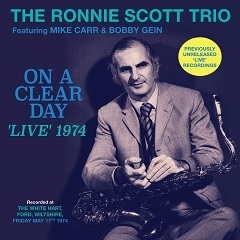 The United Kingdom, 1974: a time of the 3-Day Week, of snap-general elections
and Glam Rock: a nation rocked as much by strikes and IRA bomb blasts as by Abba
and Mud: a country in which overhung Sixties optimism was finally giving way to
crisis-driven Seventies reality. Much the same could have been said of Ronnie
Scott that year too. Indeed, when he and his band took to the stage of a tiny
pub in the backwaters of Wiltshire on a spring evening in 1974, a one-night stop
on an exhaustive nationwide tour, he was in the midst of perhaps the most
turbulent time of his life. Amid fractious personal relationships and an ongoing
battle with depression, and surrounded by a jazz scene whose very fabric had
changed unrecognisably in a few short years, Scott nevertheless remained one of
the UK's great jazz catalysts a central figure around whom much of what was
considered newsworthy within the idiom still concentrated. At forty-seven, the
saxophonist was no longer chasing the musics cutting edge; instead he had forged
a style very much his own, one which tipped its hat to many of the good and the
great who'd graced his own Soho club, but which now boasted even greater
authority, maturity and individuality than ever before. And, despite his
off-stage tribulations, he was happy with his band, a hitherto rare instance of
a Scott-led line-up lasting more than a few years. Supported by organist Mike
Carr and drummer Bobby Gein, he tore the roof off the White Hart, whose 'Jazz at
The Icebox' presentations were a magnet for West Country jazz fans, probably
unaware that what was undoubtedly just another nights work for him and his
hard-grafting colleagues was being caught on tape. Issued here for the first
time, this recording captures Scott doing what he did best: playing no
holds-barred jazz, minus the pressures that came from being a frontman for his
own club, or acting as 'support act' to his many American guests. As such, it
reveals a Ronnie Scott rarely heard on record, an instrumentalist in full-flow,
sounding relaxed yet forthright, and making a mockery of the notion that art
must mirror life. Scott may have been sailing stormy waters elsewhere but On A
Clear Day finds him at the eye of a creative hurricane. Ronnie is one of our
finest jazz musicians and saxophonists period, wrote one Melody Maker reviewer
that same year, a declaration fully borne out on this album. Packaged with
period photos, reminiscences by some of those present on the night, and an
in-depth booklet essay by award-winning saxophonist Simon Spillett, this album
makes a powerful case for a long-overdue re-evaluation of Ronnie Scott, jazz
musician, doubly so in featuring two rare examples for his oft-overlooked
soprano saxophone work. Track list...
The United Kingdom, 1974: a time of the 3-Day Week, of snap-general elections
and Glam Rock: a nation rocked as much by strikes and IRA bomb blasts as by Abba
and Mud: a country in which overhung Sixties optimism was finally giving way to
crisis-driven Seventies reality. Much the same could have been said of Ronnie
Scott that year too. Indeed, when he and his band took to the stage of a tiny
pub in the backwaters of Wiltshire on a spring evening in 1974, a one-night stop
on an exhaustive nationwide tour, he was in the midst of perhaps the most
turbulent time of his life. Amid fractious personal relationships and an ongoing
battle with depression, and surrounded by a jazz scene whose very fabric had
changed unrecognisably in a few short years, Scott nevertheless remained one of
the UK's great jazz catalysts a central figure around whom much of what was
considered newsworthy within the idiom still concentrated. At forty-seven, the
saxophonist was no longer chasing the musics cutting edge; instead he had forged
a style very much his own, one which tipped its hat to many of the good and the
great who'd graced his own Soho club, but which now boasted even greater
authority, maturity and individuality than ever before. And, despite his
off-stage tribulations, he was happy with his band, a hitherto rare instance of
a Scott-led line-up lasting more than a few years. Supported by organist Mike
Carr and drummer Bobby Gein, he tore the roof off the White Hart, whose 'Jazz at
The Icebox' presentations were a magnet for West Country jazz fans, probably
unaware that what was undoubtedly just another nights work for him and his
hard-grafting colleagues was being caught on tape. Issued here for the first
time, this recording captures Scott doing what he did best: playing no
holds-barred jazz, minus the pressures that came from being a frontman for his
own club, or acting as 'support act' to his many American guests. As such, it
reveals a Ronnie Scott rarely heard on record, an instrumentalist in full-flow,
sounding relaxed yet forthright, and making a mockery of the notion that art
must mirror life. Scott may have been sailing stormy waters elsewhere but On A
Clear Day finds him at the eye of a creative hurricane. Ronnie is one of our
finest jazz musicians and saxophonists period, wrote one Melody Maker reviewer
that same year, a declaration fully borne out on this album. Packaged with
period photos, reminiscences by some of those present on the night, and an
in-depth booklet essay by award-winning saxophonist Simon Spillett, this album
makes a powerful case for a long-overdue re-evaluation of Ronnie Scott, jazz
musician, doubly so in featuring two rare examples for his oft-overlooked
soprano saxophone work. Track list...
Rhythm And Blues Records | "Harry South - Further South (Broadcast Recordings 1960-1967)"
| 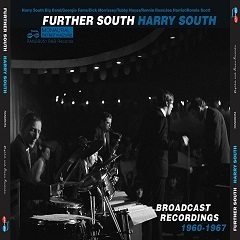 When the BBC invited pianist/composer and arranger Harry South to front his own
big band for a special edition of its flagship radio programme Jazz Club in
1960, few could have predicted the broadcast's fall-out. Although the Beeb would
offer a similar helping hand to other British jazzmen in the decade ahead making
big band leaders of a range of leading figures from Humphrey Lyttelton to Stan
Tracey none of these other bands evolved quite like South's. Beginning as a
showcase for his distinctive, often darkly dramatic, original material, and
operating as a 'jobs for the boys' forum for those British modernists he felt
closest too (among them Tubby Hayes, Dick Morrissey and Joe Harriott) the sheer
clout of South's star-packed aggregation ensured it soon attracted interest from
outside the normally closed borders of jazz purism. Indeed, when Yeh Yeh
hitmaker Georgie Fame decided to pursue his wider musical ambitions, he chose
South and his big band as his collaborators, creating the album Sound Venture, a
cross-over classic that has become one of the iconic LPs of the decade.
Assembled from South's own tape archive, and featuring a wealth of PREVIOUSLY
UNISSUED material, including NINE killer Georgie Fame tracks, Further South is
both a prequel and sequel to that landmark achievement, a four-disc document of
one of the most vibrant times in British music, a souvenir from the days when
Swinging London created its very own sound from a heady amalgam of small band
Hard Bop, Big Band Swing, R&B and Soul. Containing no fewer than ten complete
radio sessions by South's big band (and two by the Dick Morrissey Quartet) and
packaged with rare period photographs and an extensive booklet essay by
award-winning saxophonist and author Simon Spillett, this set is a must-have for
all fans of British modernism.
When the BBC invited pianist/composer and arranger Harry South to front his own
big band for a special edition of its flagship radio programme Jazz Club in
1960, few could have predicted the broadcast's fall-out. Although the Beeb would
offer a similar helping hand to other British jazzmen in the decade ahead making
big band leaders of a range of leading figures from Humphrey Lyttelton to Stan
Tracey none of these other bands evolved quite like South's. Beginning as a
showcase for his distinctive, often darkly dramatic, original material, and
operating as a 'jobs for the boys' forum for those British modernists he felt
closest too (among them Tubby Hayes, Dick Morrissey and Joe Harriott) the sheer
clout of South's star-packed aggregation ensured it soon attracted interest from
outside the normally closed borders of jazz purism. Indeed, when Yeh Yeh
hitmaker Georgie Fame decided to pursue his wider musical ambitions, he chose
South and his big band as his collaborators, creating the album Sound Venture, a
cross-over classic that has become one of the iconic LPs of the decade.
Assembled from South's own tape archive, and featuring a wealth of PREVIOUSLY
UNISSUED material, including NINE killer Georgie Fame tracks, Further South is
both a prequel and sequel to that landmark achievement, a four-disc document of
one of the most vibrant times in British music, a souvenir from the days when
Swinging London created its very own sound from a heady amalgam of small band
Hard Bop, Big Band Swing, R&B and Soul. Containing no fewer than ten complete
radio sessions by South's big band (and two by the Dick Morrissey Quartet) and
packaged with rare period photographs and an extensive booklet essay by
award-winning saxophonist and author Simon Spillett, this set is a must-have for
all fans of British modernism.
Turtle Records | "Honesty: The Unreleased 1963 Studio Sessions by Fat John Sextet" |  Continuing Turtle Records exploration into previously un-released historic
British Jazz..The unsung band leader and drummer (Fat) John Cox led several
modern jazz line ups through the 1960s, and rather like Alexis Korner in the
Blues and John Mayall in R&B, his bands were incubators of young and talented
English musical performers. With the likes of Alan Skidmore, Art Themen, Harry
Beckett, Dave Castle, John Mumford, Ron Mathewson going through the
ranks..Inspired by the Afro Cubists led by Kenny Graham whom Cox would watch
regularly in native Bristol, and the BeBop movement in general, John Cox
eventually set up his first band in 1962. The bonus tracks on disc two were
recorded by one of the early line ups a in mid-1962, at this time playing
mainstream compositions by Miles Davis, Ray Bryant and Ernie Wilkins, on the
cusp of finding their own sound, these three tracks being the only recordings of
a Fat John Cox band that ever got released. By the end of 1963 Cox had shaped
his group into a sextet with a mainstream sound. The line-up of Chris Pyne:
trombone, Ray Warleigh: alto sax, flute, Tony Roberts: tenor sax, flute, bass
clarinet, Peter Lemer: piano, Danny Thompson: bass, John Cox: drums. .In
December 1963, this sextet were invited to PYE Studios to make a demonstration
recording, testing the studio and its equipment, not the band. The results,
which turned out to be over 90 minutes of capture-the-moment-or-you'll-miss-it
early British mainstream jazz, subsequently lay in a dusty attic for 55 years
until now. The session includes two compositions, 'Fictive' written by Pete
Lemer and 'Blues For Snorty' written by Tony Roberts which are heard here for
the first time. With the help of Peter Lemer and Tony Roberts, both of whom at
the time were on the cusp of notable careers in music, augmented by a definitive
contextual essay by Simon Spillett, and photographs by Henk Visser, we have
reconstructed that snap shot in time. Track list...
Continuing Turtle Records exploration into previously un-released historic
British Jazz..The unsung band leader and drummer (Fat) John Cox led several
modern jazz line ups through the 1960s, and rather like Alexis Korner in the
Blues and John Mayall in R&B, his bands were incubators of young and talented
English musical performers. With the likes of Alan Skidmore, Art Themen, Harry
Beckett, Dave Castle, John Mumford, Ron Mathewson going through the
ranks..Inspired by the Afro Cubists led by Kenny Graham whom Cox would watch
regularly in native Bristol, and the BeBop movement in general, John Cox
eventually set up his first band in 1962. The bonus tracks on disc two were
recorded by one of the early line ups a in mid-1962, at this time playing
mainstream compositions by Miles Davis, Ray Bryant and Ernie Wilkins, on the
cusp of finding their own sound, these three tracks being the only recordings of
a Fat John Cox band that ever got released. By the end of 1963 Cox had shaped
his group into a sextet with a mainstream sound. The line-up of Chris Pyne:
trombone, Ray Warleigh: alto sax, flute, Tony Roberts: tenor sax, flute, bass
clarinet, Peter Lemer: piano, Danny Thompson: bass, John Cox: drums. .In
December 1963, this sextet were invited to PYE Studios to make a demonstration
recording, testing the studio and its equipment, not the band. The results,
which turned out to be over 90 minutes of capture-the-moment-or-you'll-miss-it
early British mainstream jazz, subsequently lay in a dusty attic for 55 years
until now. The session includes two compositions, 'Fictive' written by Pete
Lemer and 'Blues For Snorty' written by Tony Roberts which are heard here for
the first time. With the help of Peter Lemer and Tony Roberts, both of whom at
the time were on the cusp of notable careers in music, augmented by a definitive
contextual essay by Simon Spillett, and photographs by Henk Visser, we have
reconstructed that snap shot in time. Track list...
Rhythm And Blues Records | "Jazzbeat by Jack Bruce & Ginger Baker with The Johnny Burch Octet (featuring Graham Bond)" | 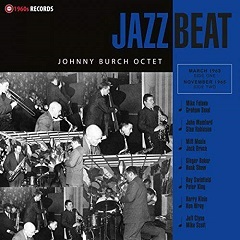 This album features the earliest-known recordings of Jack Bruce and Ginger Baker
together in a live broadcast for the BBC from March 1963. Also included is a
session that Burch's 1965 line-up recorded for BBC's Band Beat. The collection
highlights the Octet's unique role as a bridge between modern jazz and the
nascent British R&B movement. More...
This album features the earliest-known recordings of Jack Bruce and Ginger Baker
together in a live broadcast for the BBC from March 1963. Also included is a
session that Burch's 1965 line-up recorded for BBC's Band Beat. The collection
highlights the Octet's unique role as a bridge between modern jazz and the
nascent British R&B movement. More...Track Listings 1. Moanin' 2. Early in the Morning 3. All Members 4. The Champ 5. Ritual 6. Oleo 7. Stolen Moments 8. Milestones 9. Ritual (Take 1) 10. The Champ (Take 1) 11. Stolen Moments (Take 1) 12. Oleo (Take 1) 13. The Champ (Outtakes) 14. Oleo (Outtakes) 15. I Remember Clifford 16. Going Up North 17. Nightwalk 18. Del Sasser Turtle Records | "Gordon Beck Jubilation - Trios, Quartets and Septets in session 1964 - 1984" | 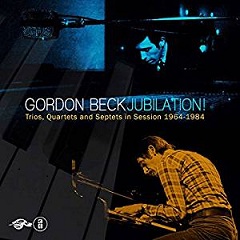 Gordon Beck, English jazz pianist and composer, broke onto the London scene in
the early 1960s, joining the Tubby Hayes group in 1962 and forming his own
succession of groups from 1965 onwards. A subsequent 26 album career established
him as one of the most important musicians in British Jazz before passing away
in 2011.
Gordon Beck, English jazz pianist and composer, broke onto the London scene in
the early 1960s, joining the Tubby Hayes group in 1962 and forming his own
succession of groups from 1965 onwards. A subsequent 26 album career established
him as one of the most important musicians in British Jazz before passing away
in 2011.The estate of Gordon Beck granted access to his own archive of analogue tape recordings which included various live performances over a 20 year period. None had been released before. Turtle Records is proud to present these excellent performances, now transferred and collated, which capture the group playing a variety of some well-known compositions plus a large number of Gordon Beck originals, which are surely a must for any serious modern jazz fan. They chronicle a peak period of creativity and performance by Gordon involving key line ups of his groups with musicians including a who’s who of British Jazz: Jeff Clyne, Johnny Butts, Ron Mathewson, John McLaughlin, Tony Oxley, Kenny Wheeler, Ray Warleigh, Chris Pyne, Frank Ricotti. The box set has been curated by noted Jazz aficionados Colin Harper and Simon Spillett, the former the author of the biography on John McLaughlin, the latter the biographer of Tubby Hayes who has also penned the essay in the booklet. With rare photographs from the lens of music photographer Jak Kilby. Presented in a clamshell box with individual discs in wallets, each covering a particular period and a 36 page booklet. Track list... Acrobat | "So Much So Quickly - British Modern Jazz Pianists (1948 - 1962)" | 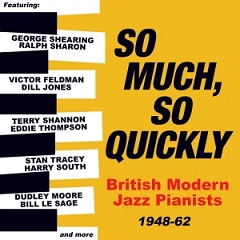 To those British jazzmen coming to terms with the Bebop revolution of the
Charlie Parker, Dizzy Gillespie and Thelonious Monk during the late 1940s,
there was one, hugely imposing barrier; harmony. The new, supersonic melodies
and off-kilter rhythms were one thing but underpinning these and forming the
very bedrock of the music was a very novel, very definite methodology, a new
system of chordal building blocks that challenged the understanding of all but
the most patient. Inevitably, it fell to the pianists – those with a map of
keyboard harmony laid out before them – to try and discover just what were
these new, at times mind-bogglingly complex routes towards the cutting edge.
“So Much, So Quickly” charts the rise and development of British modern jazz
piano during the 1940s, 50s and early 60s, charting a journey which moves from
the hip stylings of the young George Shearing and Ralph Sharon through the
classic Hard Bop of Terry Shannon, the wilful, unpredictable originality of
Stan Tracey and onto the post-Bill Evans brilliance of Gordon Beck. Over 25
tracks, the music moves from bop to cool, from soul-jazz to free-improv and
beyond, taking in the work of well-known names Dudley Moore, Victor Feldman
and Harry South, together with rarities from such overlooked contributors as
Damian Robinson, Stan Jones and Norman Stenfalt. Featuring a host of other
famous British modern jazz icons – Ronnie Scott, Tubby Hayes, Joe Harriott,
Phil Seamen et al – this release also includes an extensive booklet essay by
award-winning saxophonist Simon Spillett, period photographs and three
previously unissued tracks.
To those British jazzmen coming to terms with the Bebop revolution of the
Charlie Parker, Dizzy Gillespie and Thelonious Monk during the late 1940s,
there was one, hugely imposing barrier; harmony. The new, supersonic melodies
and off-kilter rhythms were one thing but underpinning these and forming the
very bedrock of the music was a very novel, very definite methodology, a new
system of chordal building blocks that challenged the understanding of all but
the most patient. Inevitably, it fell to the pianists – those with a map of
keyboard harmony laid out before them – to try and discover just what were
these new, at times mind-bogglingly complex routes towards the cutting edge.
“So Much, So Quickly” charts the rise and development of British modern jazz
piano during the 1940s, 50s and early 60s, charting a journey which moves from
the hip stylings of the young George Shearing and Ralph Sharon through the
classic Hard Bop of Terry Shannon, the wilful, unpredictable originality of
Stan Tracey and onto the post-Bill Evans brilliance of Gordon Beck. Over 25
tracks, the music moves from bop to cool, from soul-jazz to free-improv and
beyond, taking in the work of well-known names Dudley Moore, Victor Feldman
and Harry South, together with rarities from such overlooked contributors as
Damian Robinson, Stan Jones and Norman Stenfalt. Featuring a host of other
famous British modern jazz icons – Ronnie Scott, Tubby Hayes, Joe Harriott,
Phil Seamen et al – this release also includes an extensive booklet essay by
award-winning saxophonist Simon Spillett, period photographs and three
previously unissued tracks.
ReSteamed | Stan Tracey CBE died in 2013 at the age of 86. He was one of the most significant and celebrated British jazz musicians, known affectionately as “The Godfather of British Jazz” and responsible for a hugely impressive back catalogue of albums dating back to the 1950s. Tracey was house pianist at Ronnie Scott’s during the 1960s, performing with an array of legendary jazz musicians including Sonny Rollins, Yusef Lateef, Roland Kirk and Ben Webster (who played with Tracey on two of his ReSteamed releases). In 1965 Tracey released a jazz suite inspired by Dylan Thomas’s Under Milk Wood. It’s been praised as one of the finest British jazz albums, appearing at number 69 on the 2006 Jazzwise list of The 100 Jazz Albums That Shook the World and contained Starless and Bible Black, with its solo by Scottish tenor saxophonist and Tracey collaborator Bobby Wellins. The 2006 reissue of Under Milk Wood marked the first release on Tracey’s ReSteamed Records, his new activation of Steam Records. He went on to issue a further twelve recordings on ReSteamed - both archival and new. All of these albums will be available on these streaming and download services. Drummer Clark Tracey, Stan’s son, played extensively with his father. He has now taken over the running of the ReSteamed Records label. He’s also the author of The Godfather of British Jazz: The Life and Music of Stan Tracey which was published by Equinox Publishing in 2017. The complete discography of ReSteamed Records is as follows: RSJ101 The Stan Tracey Quartet - Under Milk Wood: Jazz Suite RSJ102 The Stan Tracey Big Band - Alice in Jazz Land RSJ103 Stan Tracey Orchestra - At the Appleby Jazz Festival RSJ104 Stan Tracey & Bobby Wellins - Tracey/Wellins Play Monk RSJ105 Stan Tracey & Keith Tippett - Supernova RSJ106 Ben Webster & Stan Tracey - Soho Nights Vol. 1 RSJ107 Stan Tracey Octet - The Early Works RSJ108 Stan Tracey Quartet - Senior Moment RSJ109 Stan Tracey Octet - The Later Works RSJ110 Stan Tracey - Soundcheck RSJ111 The Stan Tracey Quartet - A Child's Christmas: Jazz Suite RSJ112 Ben Webster & Stan Tracey - Soho Nights Vol. 2 RSJ113 Stan Tracey Quintet - The Flying Pig Bruce Lindsay (Jazz Journal) Acrobat | "The Tubby Hayes Quartet - A Little Workout" | 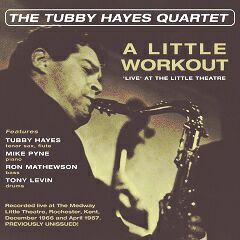 When the Tubby Hayes and his new quartet alighted on the Little Theatre in
Rochester, Kent for two evenings' worth of performances during the winter/spring
of 1966/67 both the leader and the bands music were in a period of transition.
Drawing equal inspiration from both the recent innovations of Miles Davis and
John Coltrane and the energy of his new, young and adventurous sidemen, Hayes
was to turn these to-all-intents-and-purposes typical provincial club nights
into definitive manifesto statements of his contemporary musical ambitions.
Luckily, excerpts from both these performances were captured on tape.
Occasionally bootlegged, the recordings made on these two gigs half a century
ago illustrate everything the saxophonist had learned, experienced and pioneered
up to that moment; from the blistering paint-off-the-walls bebop of Walkin, a
solo to rank alongside any of John Coltrane or Sonny Rollins extended forays
from the Sixties, through to the astonishing emotional denouement of a
seventeen-minute deconstruction of Dear Johnny B. - this isn't Hayes merely on
form; this is him on fire! This new Acrobat CD is the first ever release of
these recordings and comes packaged with rare, hitherto unpublished photographs
and a fascinating booklet note by award-winning saxophonist Simon Spillett
author of The Long Shadow of The Little Giant: The Life, Work and Legacy of
Tubby Hayes.
Track list...
When the Tubby Hayes and his new quartet alighted on the Little Theatre in
Rochester, Kent for two evenings' worth of performances during the winter/spring
of 1966/67 both the leader and the bands music were in a period of transition.
Drawing equal inspiration from both the recent innovations of Miles Davis and
John Coltrane and the energy of his new, young and adventurous sidemen, Hayes
was to turn these to-all-intents-and-purposes typical provincial club nights
into definitive manifesto statements of his contemporary musical ambitions.
Luckily, excerpts from both these performances were captured on tape.
Occasionally bootlegged, the recordings made on these two gigs half a century
ago illustrate everything the saxophonist had learned, experienced and pioneered
up to that moment; from the blistering paint-off-the-walls bebop of Walkin, a
solo to rank alongside any of John Coltrane or Sonny Rollins extended forays
from the Sixties, through to the astonishing emotional denouement of a
seventeen-minute deconstruction of Dear Johnny B. - this isn't Hayes merely on
form; this is him on fire! This new Acrobat CD is the first ever release of
these recordings and comes packaged with rare, hitherto unpublished photographs
and a fascinating booklet note by award-winning saxophonist Simon Spillett
author of The Long Shadow of The Little Giant: The Life, Work and Legacy of
Tubby Hayes.
Track list...
ARTCD | "Art Themen's New Directions" | 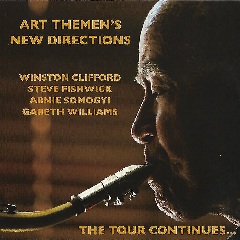 Art Themen is a veteran of the British jazz scene working initally with Michael Garrick in the late 1960's to the early 1970s. From 1975 through to 1993 he had a long association with Stan Tracey featuring in Stan's groups of all sizes from quartet to big band.
Art Themen is a veteran of the British jazz scene working initally with Michael Garrick in the late 1960's to the early 1970s. From 1975 through to 1993 he had a long association with Stan Tracey featuring in Stan's groups of all sizes from quartet to big band.Art formed this new band to showcase some of the more challenging gems from established comosers such as Dexter Gordon, Charlie Mingus, Thelonius Monk and Horace Silver bringing musicality to material that you wouldn't normally hear. It reflects his desire for a fresh though accessible examination of this music, and the additional firepower of Gareth Williams, Arnie Somogyi and Steve Fishwick adds further variety to the repertoire. The title of the album is a catchphrase adopted by the band as a wry reflection on the difficulties encountered in putting together a string of consecutive dates. The recording was made in 2016. Track list... | ||